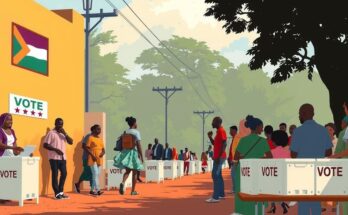Police in Mozambique opened fire during a demonstration led by opposition leader Venâncio Mondlane, resulting in two fatalities and multiple injuries. The incident raises concerns about civil rights amid ongoing political tensions, coinciding with a signed national dialogue agreement involving multiple political parties. The recent history of violence during protests illustrates the fragile state of political stability in Mozambique as the nation approaches the 2024 elections.
On Wednesday, police in Mozambique opened fire on a demonstration led by opposition leader Venâncio Mondlane in the capital, Maputo. Reports indicate that shots were fired at close range, resulting in the deaths of two children and injuries to at least 16 individuals, including Mondlane’s supporters. This situation has raised alarm as teargas was also deployed, affecting many citizens. Mondlane’s team disclosed these details in a Facebook statement, although verification of the numbers remains unattainable by EFE.
Earlier in the day, Mondlane shared a live video on his Facebook account depicting large crowds following his motorcade. This broadcast was abruptly interrupted by gunfire from security forces, with accounts from witnesses corroborating the chaos that ensued, as supporters were initially seen dancing before the scene turned chaotic with smoke and confusion.
The statement from Mondlane’s team described the police’s actions as excessively aggressive, noting that they were equipped with armored vehicles. Following the violent disruption of the protest, there were concerns regarding the location and condition of Mondlane, whose safety remains uncertain.
The demonstration coincided with an agreement signed by Daniel Chapo for an “inclusive national dialogue” involving the ruling Mozambique Liberation Front (Frelimo) and several opposition parties, including the Optimist Party for the Development of Mozambique (Podemos). Initially supportive of Mondlane’s candidacy for the upcoming elections, Podemos has since distanced itself from him and was not a party to this agreement.
According to Chapo, this is the first instance in Mozambique’s recent history where leaders from nine political parties with seats in the Assembly have come together to commit to a national dialogue aimed at improving governance. Albino Forquilha, the leader of Podemos, emphasized that the pact signifies a collective political will among Mozambicans to strive for solutions fostering political stability and reconciliation.
Mondlane previously spearheaded significant protests in late 2024 through early 2025, characterized by severe police violence that resulted in hundreds of fatalities. Following an agreement to suspend protests, the opposition set forth demands, including the cessation of violence against civilians and a reduction in basic living costs. Since that time, protests have diminished in both frequency and scale.
In the disputed election results, FRELIMO was declared the victor, securing 65.17% of the votes compared to Mondlane’s 24.19%, a result he contested by proclaiming himself the legitimately elected president of Mozambique. This maintains FRELIMO’s long-standing governance since the country’s independence in 1975.
The recent police violence against opposition supporters in Mozambique underscores ongoing political tensions as the nation approaches the 2024 general elections. The confrontation, resulting in casualties and injuries, highlights the precarious state of civil rights and public safety. Meanwhile, negotiations for an inclusive national dialogue signal attempts at reconciliation amidst increasing unrest, though skepticism remains about the government’s readiness to address longstanding issues.
Original Source: efe.com




